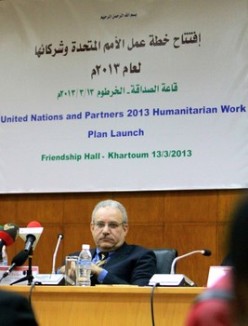UN official in Sudan says interview transcript with Norwegian newspaper inaccurate
December 2, 2014 (KHARTOUM) – The United Nations resident coordinator and humanitarian coordinator in Sudan Ali al-Zaatari denied making portions of the statements included in the interview he had with the Norwegian newspaper Bistandsaktuelt.

SMC said that the UN official described Sudan as a country living in a humanitarian and economic crisis and that the society has become dependent on aid.
Zaatari told Sudan Tribune on Tuesday that statements attributed to him are not entirely true adding that “It is inconceivable that I offend Sudan”.
While he acknowledged being interviewed by the Oslo-based newspaper, Zaatari suggested that there is a possibility that the transcript contained errors due to mistranslation from English to Norwegian.
He also did not rule out that SMC website distorted the interview as well.
The Jordanian-born official said that statements attributed to him warrant an apology from the newspaper.
“This is unfortunate and I did not utter this serious talk,” Zaatari said before noting that he has an audio recording of the interview.
He went on to say that he did describe the humanitarian situation in Sudan as difficult but emphasized that he cannot cross the boundaries of decency and politeness.
Zaatari also denied receiving any summons from Sudanese authorities to inquire about those statements.
It pointed out that Zaatari told the newspaper that the UN is striking a delicate balance in dealing with a person accused of crimes against humanity in Darfur.
“We must accept the fact that Bashir is the president of Sudan. We may or may not like it; the reality is that we must cooperate with him. Failing to deal with this is the same as condemning a nation and its people to great suffering,” Zaatari told the newspaper according to the interview transcript published on Bistandsaktuelt website.
“We work humanitarian, it is not our mandate to condemn. The ultimate goal is to reach those in need”.
SMC website said that Zaatari criticized president Bashir by saying that he ruled Sudan for decades “with an iron fist”. But Bistandsaktuelt website showed that this description of Bashir was part of a preface to the interview written by the Norwegian media house and not part of Zaatari’s statements.
SMC quoted Zaatari as sarcastically describing Sudanese people as finding it hard to live without aid and that the situation is getting worse every month.
It cited experts in international law as saying that Zaatari statements are considered offensive to the state and requires accountability and actions that preserve the prestige of the state and the dignity of the country.
According to SMC website the statements by Zaatari contradict what was said in an interview in Khartoum last month in response to comments about the re-nomination of Bashir in which he said that this is up to domestic bodies and that the UN has no objection to it, noting that the issue is political and is outside his scope of work.
Zaatari issued a separate statement later today saying that this journalistic coverage serves only to undermine the official, personal and emotional relationship that he worked hard to create for the sake of Sudan and its people.
He appeared critical of SMC website saying they could have contacted him to affirm the accuracy of what was attributed to him in the Norwegian newspaper.
“It is clear that the Norwegian newspaper did not succeed in transcribing my statements in a true and accurate manner,” Zaatari’s statement reads.
“Such criticism cannot come from me against Sudan”.
According to Bistandsaktuelt, Zaatari described the situation in Sudan as “severe”.
“It is a situation that has lasted – we’re talking 30-40 years of war, drought, floods and internal conflicts. Civilians have become accustomed to suffering. They have become addicted to emergencies. The ugly thing is that without aid, they will not survive. We are talking about 20 percent of the population. It is an exceptional situation. What is bad is that there is no light at the end of the tunnel. It is like a disease that cannot be cured, despite the treatment being known. What makes it even worse is that periodically – from daily to monthly – situation worsening for more people. It may be a group which is already exposed, or new groups”.
He said that situation in Darfur cannot last forever adding that the international community is fatigued.
“Less than 45 percent of the money appealed from donors is received. It is easier to get money for emergencies than aid. Conducting development is not easy at all. You cannot go in and say that I will build capacity for ministries in Darfur – we do not have the resources to do it” Zaatari was quoted as saying.
He said that the Darfur conflict is not just between the government and rebel groups but that there are now ethnic clashes between tribes.
(ST)
